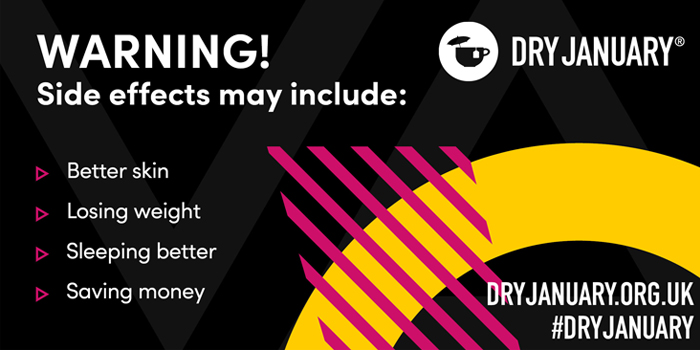Banish the booze
In Population Health
Follow this topic
Bookmark
Record learning outcomes
Some 4.2 million people are projected to ditch the booze for Dry January in 2019 to save money, feel better and improve their relationship with alcohol, as well as their health, long term
The post-Christmas blues, miserable weather and suffering bank balances are enough to make anyone feel sluggish during January, but a month off alcohol may just be the answer. Cutting down alcohol consumption for good can be hard, Dry January is an ideal catalyst for change and pharmacy teams can be on hand to offer support and advice to help customers break the booze habit long term.

The problem with alcohol
Alcohol is a regular part of many lives, often found at the centre of celebrations and social events. What’s more, drinking alcohol is legal, socially acceptable and sometimes actively encouraged. However the consequences of alcohol are far from acceptable: with 60 health conditions linked to the bottle, including mouth, throat, stomach, liver and breast cancers; high blood pressure; cirrhosis of the liver; and depression, alcohol is the biggest cause of death for people aged 15-49 in the UK.
In small doses alcohol has limited effects on health, but the ‘normal’ amount for a lot of people is high and therefore harmful. The UK’s chief medical officer recommends that men and women drink no more than 14 units of alcohol per week, over three or more days, and with at least two drink-free days. While 20 per cent of the population report not drinking at all, 24 per cent of adults in England regularly drink over these low-risk guidelines. Some 27 per cent of drinkers binge drink on their heaviest drinking days, at over eight units for men and over six units for women, increasing their risk of developing alcohol-related health problems. But this is where Dry January can help.
New year, new you?
Dry January has been changing the conversation about alcohol for the past seven years and the campaign has gone from strength to strength. The inaugural 2012 campaign reached 4,000 people and a YouGov poll estimates that 4.2 million plan to get involved 2019 – that’s an impressive one in 10 people who drink in the UK.
Of those taking part in Dry January last year, 88 per cent reported that they saved money, 71 per cent felt they slept better and 58 per cent lost weight, and that was just the beginning. A study of 800 Dry January participants by the University of Sussex found that after taking part in the challenge, by August the average number of drinking days per week dropped from 4.3 to 3.3 and the units consumed per drinking day dropped on average from 8.6 to 7.1.
While Dry January encourages people to kick start 2019 feeling healthier and in control, its impact reaches far beyond this month-long period, according to Dr Richard Piper, chief executive of Alcohol Change UK – the charity behind Dry January. “The brilliant thing about Dry January is that it’s not really about January. Being alcohol-free for 31 days shows us that we don’t need alcohol to have fun, to relax, to socialise,” he says. “That means that for the rest of the year we are better able to make decisions about our drinking, and to avoid slipping into drinking more than we really want to.”
Get involved
Those signed up to Dry January are much more likely to stay on track and stay off the booze for the whole month. Regular support emails are sent out with tips, tricks and information from experts to make the month easier and more fun.
The Dry January website includes a blog, where stories are posted from people participating to increase motivation, and support can also be found via the campaign’s podcast and Facebook community.
Alcohol Change UK also encourages people to download the brand-new Try Dry: the Dry January app via the App Store or Google Play. The app includes a calorie counter, unit tracker and a tool to show how much money participants have saved. This year also sees the launch of the official Dry January book – Try Dry: The Official Guide to a Month Off Booze – with a foreword by comedian Lee Mack, which is an inspirational guide to cutting back on alcohol.
Pharmacies are in the perfect position to promote Dry January in their local community and support customers taking on the challenge. Dr Piper encourages pharmacies to get involved. “There’s not much of a better start to the New Year health-wise than Dry January; it’s been found to lower cholesterol and blood pressure, and to reduce the level of cancer-related proteins in the blood,” he says. “Pharmacies are at the heart of their communities and people trust them to give accurate health advice. Why not use Dry January to help your community to have a happier and healthier 2019?”
Free campaign resources including use of the logo, social media assets, poster templates and more are available from Alcohol Change UK.
